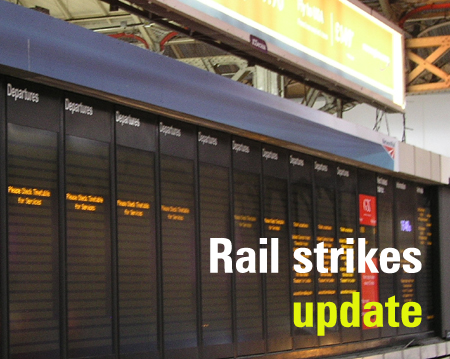Posted 20th June 2022 | 2 Comments
Last ditch talks fail to avert rail strikes

Talks have been taking place over the weekend in a bid to avert national rail strikes this week, but without any progress towards a settlement in the RMT dispute over pay, conditions and jobs.
Both sides are accusing the other of failing to co-operate. The RMT has claimed that operators were refusing to even join the discussions, while transport secretary Grant Shapps said the union’s call for discussions had been a ‘stunt’. He added that the government would not intervene because the dispute was a matter between the employing rail companies and the union.
The effects of the action, planned mainly for tomorrow, Thursday and Saturday, will be widespread, with only about one in train in five running. Some parts of the country, including Cornwall and much of East Anglia, will have no trains at all, and the operators say they cannot provide replacement buses in most cases.
The RMT is involving some 40,000 staff including signallers, depot fitters and station staff. Network Rail is deploying emergency replacements at some signal panels, but smaller boxes will be closed.
There will also be strikes elsewhere in the near future, including a 24-hour strike on London Underground tomorrow. ASLEF has announced strikes of its driver members at Greater Anglia on 23 June, which will coincide with the second RMT strike day.
The white collar union TSSA is balloting its members at Avanti West Coast, and a future walkout there could affect operational managers as well, who will not then be available to stand in for absent staff. TSSA is also balloting more than 6,000 Network Rail staff for strikes and action short of a strike, while ASLEF, which represents most drivers, is balloting its members at nine other operators.
London tram drivers are set to stage two 48-hour strikes on 28-29 June and 13-14 July, while open access operator Hull Trains faces disruption on 26 June, when its drivers will walk out for the day.
Reader Comments:
Views expressed in submitted comments are that of the author, and not necessarily shared by Railnews.

Tony Pearce, Reading
In my last job we saw the Internet coming. We spent £Millions to be on-line. But it soon reduced our share price to worthless. It was obvious where it was going so I seized the redundancy package with both hands and left. The Miner's should have done that back when Scargill and Thatcher were battling it out. Now the Railway Staff should recognise what the Internet and Working-from-home has done to London Commuting. The RMT should put all its efforts into securing an excellent redundancy package, which is more easily able to be won than a pay rise.
Tony Pearce, Reading
Strikes are like Nuclear Weapons. They work best as a 'threat'. If you have to use them then you have lost.